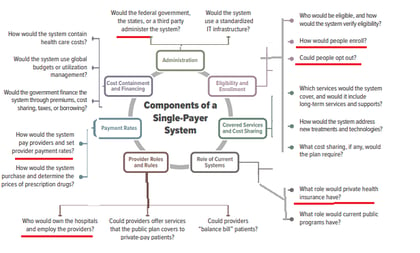A Democrat at a House Budget Committee hearing had a question Wednesday about proposals to create a government-run, “single-payer” health insurance system for the United States: Why not put the government in charge of the U.S. health care delivery system, too?
Rep. Joseph Morelle, D-N.Y., suggested that the government could run the hospitals, and employ the doctors, as well as providing all of the health insurance.
“If you were to design a system that was single-pay, or a public system, from the start, one of the choices you could make is … not only the insurers being public, but also the providers being public,” Morelle told Mark Hadley, the deputy director of the Congressional Budget Office (CBO), at the hearing, which was streamed live on the web.
(Related: Individual Health Shrinkage Drives Up Uninsured Rate: CBO Data)
Morelle asked Hadley to talk about “operating, essentially, public hospitals, with government employee health care providers.”
Hadley suggested that one possible approach would be to have physicians and other providers be salaried employees, but that health care delivery system designers might also want to include additional mechanisms that would encourage providers to provide more services, and to focus on patient health outcomes.
Whether the providers’ employer is private or public, system designers would have to think carefully about how to structure the providers’ financial incentives, Hadley said.
Today, when public and private payers pay physicians fees for each service provided, “the incentive is to provide more care,” Hadley said. “There are studies that show that incentive to do that goes beyond what’s optimal.”
The Hearing
The House Budget Committee organized the hearing to consider legislation, proposed by Rep. Pramila Jayapal, D-Wash., and others, that could replace the current U.S. health finance system with a single health insurance system that would be run entirely by the federal governmetn.
Rep. John Yarmuth, D-Ky., the chairman of the committee, said the current system is clearly working poorly.
“Last year, health spending accounted for 18% of our economy,” Yarmuth said at the hearing. “We spend upwards of $3.5 trillion annually as a nation on health care. More per person than any other country. And yet our outcomes are some of the worst among the developed nations.”
(Related: Drugs Might Be the 2019 Health Cost Good Guy: CMS Actuaries)
Drug prices and consumers’ out-of-pocket costs are skyrocketing, while insurance companies, and insurance companies’ chief executive officers, “post massive profits,” Yarmuth said.
The CBO’s Diagram
CBO analysts recently released on a guide for policymakers on the elements of health care finance and delivery systems, and the kinds of questions policymakers would have to answer if they wanted to set up a Medicare for All program for the United States.
(Related: Changing U.S. Health Finance Involves, Um, Words: CBO)









 May 23, 2019 at 01:06 PM
May 23, 2019 at 01:06 PM











